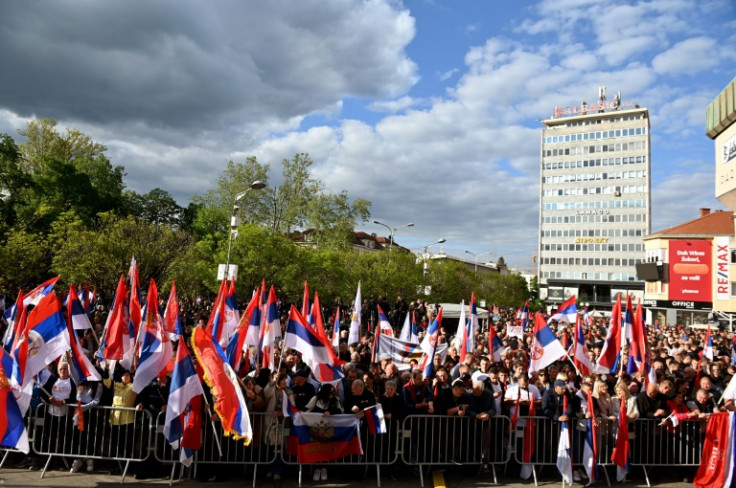
Several thousand Bosnian Serbs protested Thursday in Banja Luka against a potential UN resolution to declare July 11 an international day to remember the Srebrenica genocide.
Alongside a massive Serbian flag unfurled in the city's streets, thousands responded to the call of Bosnian Serb secessionist leader Milorad Dodik.
"We do not want to live with you, who want to tell the Serbian people that they are genocidal," he told the crowd.
Bosnian Serb forces captured Srebrenica -- a UN-protected enclave at the time -- on July 11, 1995, a few months before Bosnia's inter-ethnic war ended.
In the following days they summarily killed some 8,000 Bosnian Muslim men and boys from the eastern town.
The remains of most of the victims were later found in mass graves in eastern Bosnia, where the perpetrators moved them from original burial sites to cover up the crime.
Europe's worst single atrocity since World War II was deemed genocide by international justice.
Under a settlement to end the war, Bosnia was divided into two semi-autonomous zones, one run by Bosnians and Croats, and another by Serbs, with Banja Luka as its capital.
Dodik, president of the Serbian entity, has been demanding greater autonomy.
According to a draft resolution prepared by Germany and Rwanda, which was seen by AFP, from next year, which will be the 30th anniversary of the massacre, July 11 would become the "International Day of Remembrance of the Srebrenica Genocide".
Dodik, who has repeatedly denied that the Srebrenica massacre was a genocide, labelled the resolution unacceptable.
"I regret every victim," but "it is a lie that 8,000 people were killed in seven days," he told RTRS radio on Thursday.
"They want to impose historical responsibility on the Serbs," he added, hoping for "more than 40,000 people" at the protest.
"Those who carried out genocide against our and other people in Europe want to stick us a label that belongs to them," Dodik said on X in a video with nationalist rhetoric calling for the protest.
In 2007, Dodik, who had been a darling of the West in the late 1990s, said that he knew "perfectly well" that the massacre was a "genocide".
A decade later, he declared "with full awareness" that "there was no genocide in Srebrenica".
Dodik, a close ally of Russian President Vladimir Putin, regularly pays tribute to Bosnian Serb wartime leader Radovan Karadzic and his army chief Ratko Mladic.
They were both sentenced to life in prison by a UN court for war crimes during Bosnia's 1992-1995 conflict, notably for their role in Srebrenica.







